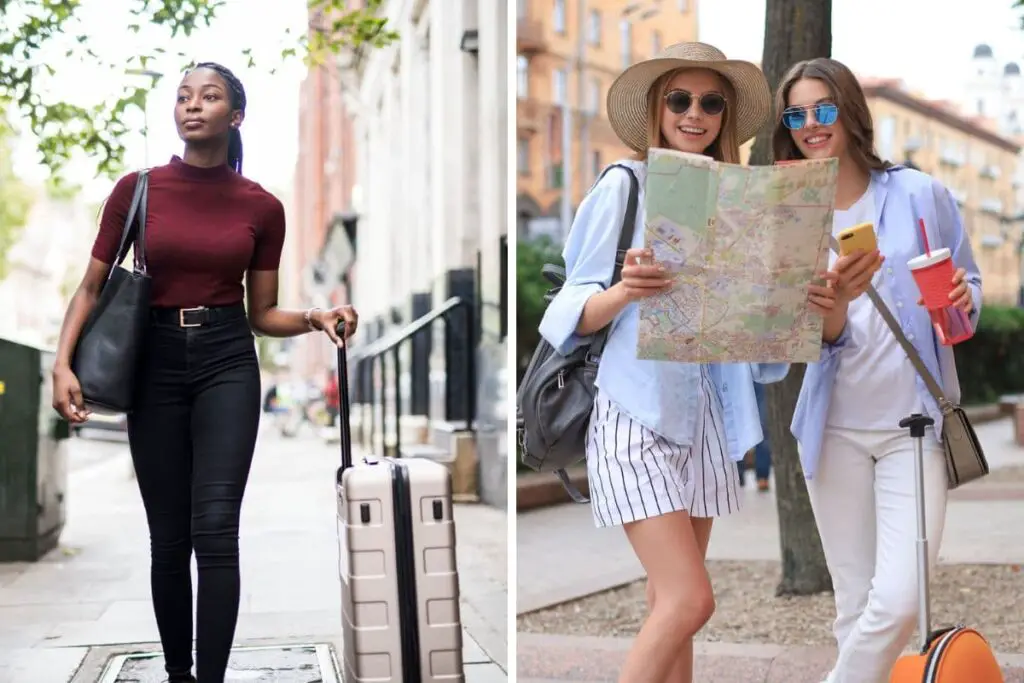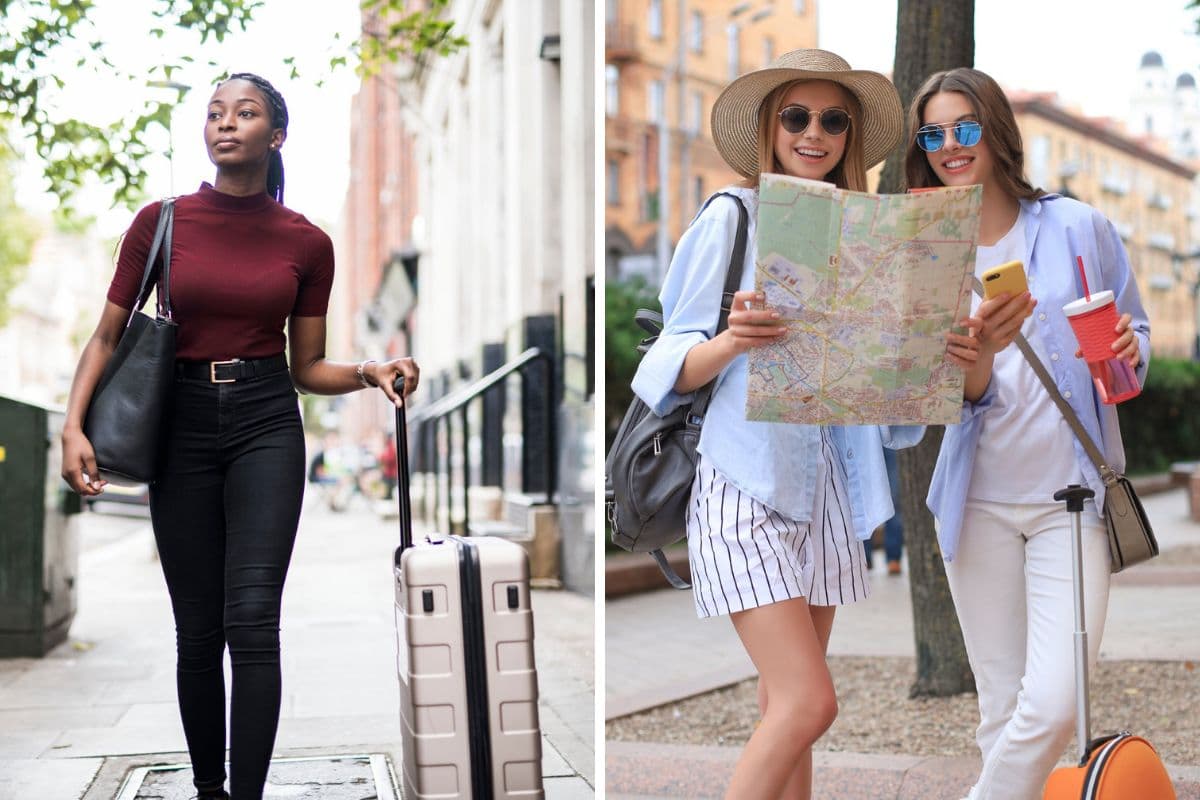Many people want to travel, but when they decide to hop on a plane and go somewhere new, they have to decide if they want to embark on this journey alone or with a friend. Both solo travel and traveling with someone have benefits and drawbacks, but which is more affordable?
and drawbacks, but which is more affordable?
Generally, traveling with a friend is cheaper because you can split the costs of transportation, accommodation, food, and attractions. However, there are also many ways to save money while traveling solo.
In the rest of this article, I’ll explain why it’s usually cheaper to travel with someone than it is to travel solo. However, I’ll also give money-saving tips that solo travelers can use to stay within their budget in case you don’t have a friend who can travel with you.

Why It’s Typically Cheaper to Travel With a Friend
It is typically cheaper to travel with a friend than to travel solo because traveling with at least one other person grants you the opportunity to split certain costs.
Splitting Transportation Costs
One of the biggest expenses for travelers is transportation. While public transportation will cost the same whether you’re with a friend or not, sometimes it is impossible to get to a destination using only public transportation. In this case, you’ll need to get a taxi, shuttle, rideshare, or rent a car.
In many destinations, these means of transportation are not cheap. However, if you’re traveling with a friend, you can split that cost instead of one person paying for it on their own. Additionally, renting a car gives you more freedom to go where you’d like without the hassle and expense of public transportation. This can save you money in the long run, especially if the cost is divided between two people.
Splitting Accommodation Costs
Another significant expense is accommodation. There are budget-friendly accommodations for solo travelers in many destinations, but these accommodations don’t always work for everyone. Most solo travelers can only afford to sleep in hostel dorm rooms, which is a great way to meet people but isn’t always comfortable or conducive to getting a good night’s rest. Additionally, not all travel destinations have affordable hostels.
Alternatively, if you’re traveling with a friend, you can split the cost of a private room in a hostel, hotel, or Airbnb, and the price per person can be comparable to the cost of a dorm bed, depending on the accommodation.
In this case, traveling with a friend saves money and allows you to stay in nicer and more private places than you would’ve been without someone to split the price.
Splitting Food Costs
Another area where having someone with you during your travels can save you money is food. When traveling solo, you don’t have the option of splitting a meal with someone if you aren’t that hungry but still need to eat, whereas if you’re with a friend, you can! Many hostels have public kitchens where you can keep leftovers, but not all of them do.
Additionally, many people find it easier to cook for two than just themselves, so you might be more tempted to buy groceries and cook meals if you’re with someone than if you’re just on your own.
Splitting Attraction Costs
Finally, one of the best parts of traveling is going to various attractions and seeing what each destination offers. However, if you’re alone, this can get expensive. Some attractions require a tour or a guide; if you’re alone, you’ll have to foot this bill on your own.
Often, you’re able to join a group or find people to go with in shared accommodations, but this isn’t always the case, and it would be a shame to miss out on seeing something because you can’t afford the tour by yourself. If you always have a friend with whom you can split the cost, you don’t have to worry about missing out or blowing your budget.
Traveling with a friend is generally more economical than traveling alone, but that doesn’t mean that solo travel is out of reach. If you don’t have anyone to travel with, there are many ways you can save money during solo travel to help you keep to your budget.
While we’re on the topic of costs, I recommend reading my breakdown of your expenses for a solo trip. I cover different types of accommodation and transportation and provide a few estimates on how much you’ll have to spend. [Here’s How Much It Costs To Travel Alone (Breakdown)]
How To Save Money Traveling Solo
One of the main identifying factors of long-term travelers is their dedication to budgeting their money and getting the best value . By making smart financial choices, sacrificing some comforts and luxury, and getting creative, you can save money traveling solo and make it almost as economical as traveling with a friend. Here are some money-saving tips:
. By making smart financial choices, sacrificing some comforts and luxury, and getting creative, you can save money traveling solo and make it almost as economical as traveling with a friend. Here are some money-saving tips:
- Stay in dorm rooms in budget-friendly, backpacker hostels instead of in hotels, bed-and-breakfasts, or pricey Airbnbs.
- Eat street food or at local markets instead of buying all your food at restaurants.
- Purchase groceries and cook your meals using public kitchens at hostels.
- Save your leftovers in tupperware.
- Pick budget-friendly destinations that have backpacker culture and infrastructure.
- Stay in accommodation outside of large, touristy areas.
- Use public transportation, such as metros, colectivos, tro-tros, and more.
- Travel during the off-season or shoulder season.
- Travel to destinations that have good exchange rates with your native currency.
- Enjoy free attractions, such as public parks and museums, and free walking tours of major cities.
- Make friends with people at hostels to go on tours with.
- Do your own laundry at laundromats or in a sink.
- Negotiate prices for tours.
- Look on social media for free or affordable events and activities.
- Camp or spend the night in a hammock where appropriate and possible.
Traveling solo doesn’t have to be a budget-buster; you just might have to be more creative and resourceful with how you spend your money.
Conclusion
There are pros and cons of traveling with a friend instead of solo, but one of the biggest advantages of having a travel buddy is the money it saves. However, if you don’t have a friend who can travel with you, you can save money traveling solo by staying in shared rooms, eating local food, choosing budget destinations, and other means.

